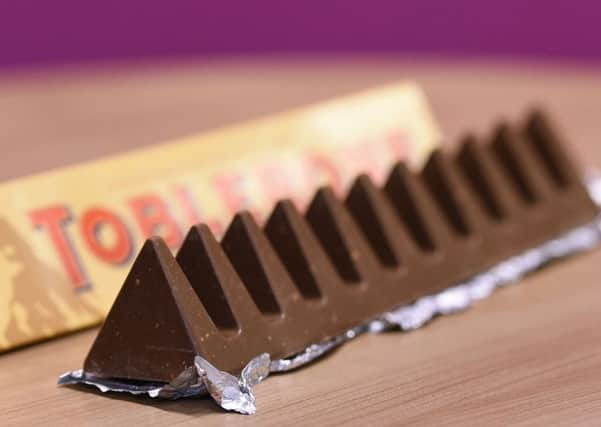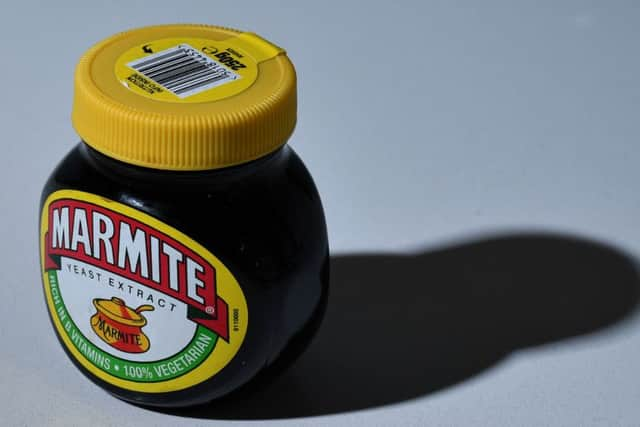Brian Monteith: Toblerone hysterics are hard to swallow


Claiming a possible price hike in Marmite was due to the Brexit vote was the most ridiculous claim amongst a litany of false predictions and wild scaremongering by pro-EU campaigners. Now we have an SNP member of the Scottish Parliament wasting parliamentary time lodging a motion that the change in Toblerone size is emblematic of Brexit. The smaller sizes of the chocolate bar now have fewer triangles.
If this bothers anyone then the answer to both issues is simple. Exercise personal choice and show the manufacturers what you think of them.
Advertisement
Hide AdAdvertisement
Hide AdMarmite is a by-product of brewing, which is why it is made in England’s beer capital, Burton-on-Trent. It’s not made on the European continent or anywhere else for that matter – just the one factory in the world with its ingredients all supplied locally. The currency exchange rate is of no consequence, the sterling-euro rate or the sterling-dollar rate have no impact on the cost of Marmite, so the (unjustified) fall in sterling related to currency market fears about Brexit cannot be blamed.


The attempt by Marmite’s owners, Unilever, to squeeze money out of Tesco was no more than corporate bullying – that failed. If Unilever wanted to make Marmite more expensive at Tesco’s it was the multinational’s lookout. I could always have gone to another supermarket that might think it clever to price the spread competitively as a loss leader to draw in customers – or I could switch to Vegemite or other similar brands and make Marmite the loser.
I certainly would not let Unilever tell me how to vote. In the end Unilever quickly backed down, such was the national outrage at its too-clever-by-half tactics.
The fuss about Toblerone is just as daft. For a start Toblerone, although owned by a US company, is still made in Berne, which is in Switzerland – a proud independent country outside the European Union the last time I looked.
Advertisement
Hide AdAdvertisement
Hide AdThe sterling-euro exchange rate is of no consequence to its manufacture and neither is Brexit. Unprocessed cocoa that makes chocolate is priced in dollars but as these would be converted from Swiss francs the manufacturer’s costs are not relevant to the end price, all that matters is the price of sale in the UK. If there is a currency fluctuation (and over the last six months these have gone up as well as down) it is easier and simpler to alter the price rather than the moulds that make the chocolate bar.


So why the change? Call me a cynic but it’s an obvious marketing ploy to attract mock outrage from those that don’t like change or want their name in the media. Funny how the larger more expensive bars with more chocolate in them have not been changed.
In the past Coca-Cola discovered that talking about changing the recipe for Coke won lots of free publicity and sales went up. In the end the Coca-Cola kept the original recipe. D’oh!
Already people are “protesting” that they want the normal number of chocolate pyramids in their Toblerone bar – Brexit or no Brexit. Why, I’m even writing about it.
Advertisement
Hide AdAdvertisement
Hide AdLast month inflation fell, despite the Governor of the Bank of England getting it wrong again by saying it would go up. Brexit will not be without its bumps, and for a variety of reasons that have nothing to do with Brexit (such as the fluctuating price of oil) inflation will go up and down too.
If Toblerone and Marmite did indeed become dearer then for me then it would still be a price worth paying.
Trump didn’t win the election, Clinton lost
The what-might-have-beens and background revelations about what cost Hilary Clinton the election as US president continue to rumble on.
Two I thought were particularly interesting and worth retelling. The first is that for those who thought Trump would have been defeated if he had fought the left-winger Bernie Sanders, or Clinton had made Sanders her running mate. I can report it would probably have made Trump’s election easier. I’ve just read a rather long list of political skeletons from Sanders cupboard that the Republicans had researched that would have made him unelectable once released. Sanders was a disaster waiting to happen.
Advertisement
Hide AdAdvertisement
Hide AdSecondly, for all the outrage about Trump winning it has been reported that half of the demonstrators in Portland, Oregon, which the police classified as a “riot” had not bothered to vote.
Apocryphal? Maybe. What is beyond dispute is that in 2008 Obama garnered 69.5 million votes but in 2016 Clinton managed only 62 million. What happened to those 7.5 million Democrats explains why Clinton lost.
Soldiering on as if nothing has changed not an option
Whatever happens in the United States I think we can be certain that the election of “The Donald” will have big ramifications across Europe, not least in how our neighbouring countries defend themselves.
For years they have been content to let US taxpayers carry the burden with only Estonia, Greece, Poland and the UK meeting the Nato target of spending two per cent of Gross Domestic Product on defence. Germany would need to spend an extra $30 billion to meet the target threshold while France would have to spend an extra $6bn, Italy an extra $18bn, and Spain an extra $16bn. With Spanish youth employment at an unbelievable 43 per cent, Italy’s at 39 per cent and France’s at 24 per cent hiring more squaddies and teac